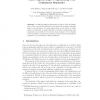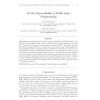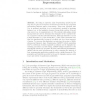111
click to vote
LICS
2000
IEEE
15 years 6 months ago
2000
IEEE
This paper explores the connection between semantic equivalences and preorders for concrete sequential processes, represented by means of labelled transition systems, and formats ...
163
click to vote
LICS
2000
IEEE
15 years 6 months ago
2000
IEEE
We prove that several problems concerning congruences on algebras are complete for nondeterministic log-space. These problems are: determining the congruence on a given algebra gen...
118
click to vote
LICS
2000
IEEE
15 years 6 months ago
2000
IEEE
We consider two-player games which are played on a finite state space for an infinite number of rounds. The games are concurrent, that is, in each round, the two players choose ...
123
Voted
LPNMR
2001
Springer
15 years 6 months ago
2001
Springer
Much work has been done on extending the well-founded semantics to general disjunctive logic programs and various approaches have been proposed. However, no consensus has been reac...
110
Voted
LPNMR
2001
Springer
15 years 6 months ago
2001
Springer
Abstract. Considering different implication operators, such as Lukasiewicz, G¨odel or product implication in the same logic program, naturally leads to the allowance of several a...
127
click to vote
LPNMR
2001
Springer
15 years 6 months ago
2001
Springer
Schlipf (Sch95) proved that Stable Logic Programming (SLP) solves all NP decision problems. We extend Schlipf’s result to prove that SLP solves all search problems in the class ...
154
Voted
LPNMR
2001
Springer
15 years 6 months ago
2001
Springer
In this paper, we continue to explore many-valued disjunctive logic programs with probabilistic semantics. In particular, we newly introduce the least model state semantics for suc...
120
click to vote
LPNMR
2001
Springer
15 years 6 months ago
2001
Springer
Abstract. According to Dynamic Logic Programming (DLP), knowledge may be given by a sequence of theories (encoded as logic programs) representing different states of knowledge. Th...
135
click to vote
LPNMR
2001
Springer
15 years 6 months ago
2001
Springer
Abstract This paper describes a generic compiler, called plp, for translating ordered logic programs into standard logic programs under the answer set semantics. In an ordered logi...
121
Voted
LPNMR
2001
Springer
15 years 6 months ago
2001
Springer
In this paper bounded model checking of asynchronous concurrent systems is introduced as a promising application area for answer set programming. As the model of asynchronous syst...



